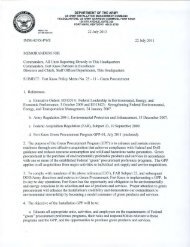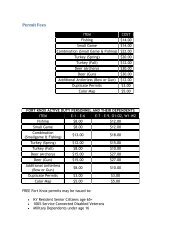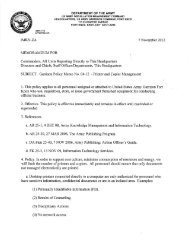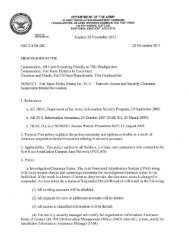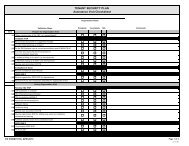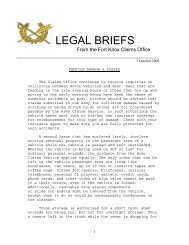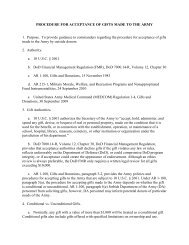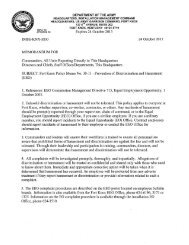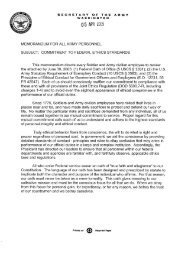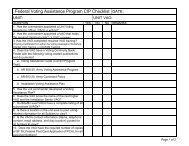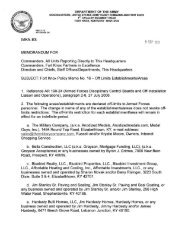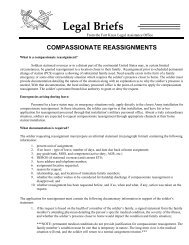Pretrial Punishment - Fort Knox - U.S. Army
Pretrial Punishment - Fort Knox - U.S. Army
Pretrial Punishment - Fort Knox - U.S. Army
You also want an ePaper? Increase the reach of your titles
YUMPU automatically turns print PDFs into web optimized ePapers that Google loves.
9 October 2008<br />
Information Paper<br />
Subject: <strong>Pretrial</strong> <strong>Punishment</strong><br />
1. Purpose. To provide an overview of the legal and regulatory background for current<br />
policies regarding pretrial punishment and to discuss some of the “dos” and “don’ts”<br />
involving pretrial punishment.<br />
2. Resources.<br />
1. www.usapa.army.mil (provides links to all <strong>Army</strong> Regulations and the<br />
Manual for Courts-Martial)<br />
2. The Manual for Courts-Martial<br />
(http://www.apd.army.mil/pdffiles/mcm.pdf)<br />
3. AR 27-10 (http://www.apd.army.mil/pdffiles/r27_10.pdf)<br />
4. <strong>Fort</strong> <strong>Knox</strong> Regulation 27-10<br />
(http://www.knox.army.mil/garrison/doim/publications/regs/R27-<br />
10.pdf)<br />
5. TRADOC Regulation 350-6 (pertaining to trainees)<br />
(http://www.tradoc.army.mil/tpubs/regs/r350-6.pdf)<br />
3. Questions and Contact.<br />
If you are a leader, and you have questions about what constitutes proper and<br />
improper punishment or restraint, call your trial counsel at 4-0996.<br />
4. Discussion.<br />
Punishing a Soldier without a finding of guilt at an Article 15 or a court-martial is<br />
illegal. Article 13 of the Uniform Code of Military Justice (UCMJ) prohibits the<br />
imposition of punishment or penalty upon an accused prior to trial, as well as pretrial<br />
arrest or confinement conditions which are more rigorous than "the circumstances<br />
required" to ensure the Soldier's presence at trial.<br />
To determine whether an action by the chain of command against a Soldier<br />
amounts to illegal pretrial punishment, look at the action to determine if the chain of<br />
command intended to punish the Soldier before trial. The test is whether the action was<br />
reasonably related to a legitimate governmental objective. If the action was not<br />
reasonably related to a legitimate goal—if it was arbitrary or purposeless—it is most<br />
likely illegal punishment.<br />
For example, if the command takes action against a Soldier, who is accused of<br />
misconduct, that is designed to be humiliating (such as name calling), makes a public<br />
spectacle of the Soldier that is designed to be embarrassing, suggests that the Soldier is
already guilty before trial, or if the command does or says things that suggest fellow<br />
Soldiers should not associate or aid the Soldier in any way, those actions will likely<br />
amount to illegal pretrial punishment and should be avoided.<br />
Most of the rules about illegal punishment are designed to maintain the necessary<br />
respect for the fact that Soldiers are innocent until proven guilty and to maintain proper<br />
reverence for the fairness of the Military Justice process.<br />
By way of example, if a commander wants to court-martial a Soldier for<br />
misconduct and then the commander calls a formation and tells all present that, “nobody<br />
will associate with this Soldier. He is a criminal and will be in jail in a month. His<br />
actions are an example of what not to do,” that is problematic. Those Soldiers in that<br />
formation may want to be witnesses for the accused Soldier and may now be scared to<br />
come forward because they fear the company commander’s wrath. They may also lose<br />
faith in the Military Justice System because the commander has stated that the trial WILL<br />
result in confinement.<br />
Similarly, if a commander sees that a Soldier has engaged in misconduct and does<br />
not want to give him an Article 15 or refer the case to a court-martial, and yet the<br />
commander assigns the Soldier extra duty, it may be illegal pretrial punishment. Extra<br />
duty in the form of corrective training is allowed. As mentioned above, the corrective<br />
training must be specifically tailored to address the alleged misconduct. Again, by way<br />
of example; if a Soldier is having trouble getting to formations on time, the Soldier may<br />
be directed to teach a class to his peers about the importance of timeliness in the military.<br />
That Soldier may be directed to spend time researching the issue. He or she may also be<br />
directed to come to formations earlier than other Soldiers. That Soldier may not be<br />
directed to dig fox holes and then fill them up again because that doesn’t relate to the<br />
Soldier’s problem.<br />
5. Conclusion.<br />
It all comes down to the commander’s intent. The commander may direct that a<br />
Soldier receive corrective training. A commander may not use punishment as a training<br />
method. If a commander wants to punish a Soldier, there must be an Article 15 or a<br />
Court Martial.<br />
Approved by: Chief, Criminal Law Division<br />
US <strong>Army</strong> Armor Center and <strong>Fort</strong> <strong>Knox</strong>



